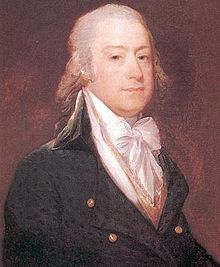William Loughton Smith was a fervent Federalist from Charleston, South Carolina. I was going to say he was one of the few men named William Smith in early America not related to Abigail Adams, but then I found that they were distant cousins; Abigail’s first patrilineal ancestor in America was William Loughton Smith’s great-great-grandfather.
During the election of 1796, Smith wrote (or perhaps collaborated with Oliver Wolcott, Jr., in writing) an attack on Thomas Jefferson signed “Phocion.” (Lately that has been ascribed to Alexander Hamilton, but contemporaries seem largely agreed that Smith was responsible; Jefferson and his circle even referred to him as “Phocion Smith.”)
As a reward for Smith, President Adams made him the U.S. minister to Portugal. On 21 Oct 1797 Smith wrote back from his new posting to James McHenry, the Secretary of War:
I wrote you since my return to Lisbon, & have therefore nothing to communicate but the account of the Dinner I gave on the 19th. to the Americans here to celebrate the President’s birth-day: I was not perfectly prepared for such an occasion having been only a fortnight in my house; thinking however that it was best to do the thing even imperfectly than to let the Day pass unnoticed, I exerted myself, & made out tolerably well. I enclose you an account of the Celebration which Fenno will publish I am sure with pleasure; the Toasts are on a Separate paper for your information; you will think them not worth publishing.The item that Smith wanted McHenry to give to John Fenno, the Boston-born editor of the Federalist Gazette of the United States, reported:
Among my Guests was a Captain Israel who informed me that he was the Son of the famous Israel Israel:—we were the best friends in the world; I have been told that there were two or three Jacobins [Democratic-Republicans?] present, but they all behaved extremely well; they joined in the Toasts with great zeal & we sang & were very merry; at first they were bashful, but when I set them the example of singing, they threw aside reserve & were very convivial.
Thursday the 19th. October being the Anniversary of the President’s Birth, was celebrated at Lisbon by Mr. Smith, the Minister of the United States at that Court, who gave on the Occasion an Entertainment at his Hotel at Buenos-Ayres to a numerous and respectable Company of American Captains & Citizens. After sixteen patriotic Toasts intermixed with convivial songs, the Company, having spent the day with great good humor and festivity, broke up at nine o’clock, much pleased with the occasion, which had collected together so many Americans at such a distance from home. All the American vessels in the Harbour were gayly decorated during the day & at twelve o’clock a federal salute of sixteen guns was fired by some of them in honor of the day, and at five in the afternoon was repeated. This Anniversary occurring on a day, highly distinguished in the Annals of the American Revolution by the Surrender of York-town, the recollection of so auspicious an event could not fail to increase the happiness of the Company.Of course, Smith was celebrating the 19th of October while Adams had long before adopted 30 October as his Gregorian-calendar birthday.
(Smith’s letter was undated when published in the Sewanee Review, but he must have written it in 1797 because that’s the only year in Adams’s administration when “the 19th. October” was a Thursday.)

A prominent figure in the First American bourgeois revolution, first vice president and second president of the United States. He began his political career as a critic of the Stamp Act, gaining fame with articles published in the Bostongazette and in 1768 reprinted in London under the title "Essay on the Canon and Feudal Law". He clearly deserved a holiday in his honor
ReplyDelete